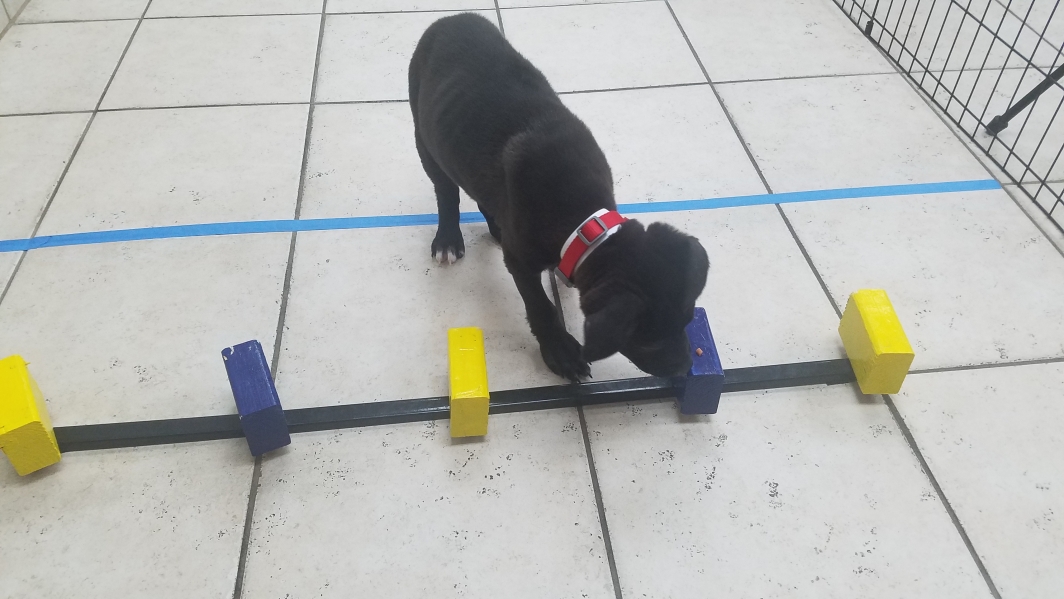How effective is clicker training? Do field trips reduce stress in shelter dogs?
These are the types of questions asked by researchers in the Canine Science Collaboratory at Arizona State University. The goal of the collaboratory is to improve the lives of dogs and their people, and sometimes that means devising experiments to test how well training methods work or whether shelter programs function as intended.
“Our research on the welfare of dogs requires that we seek to understand the animal’s experience and not just what we hope for the dog,” said Lisa Gunter, Maddie’s Fund Research Fellow in the ASU psychology department. “We might think a training method or shelter program is great, but we also have to think about it and assess it from the perspective of the dog.”
The lab recently published two studies that take the perspective of dogs. The first study assessed whether clickers can train dogs faster or better than other positive reinforcement methods. The second study examined how a common shelter program affects stress levels in shelter dogs.
Clicker training: Better than a treat?
Clicker training is popular, but there are few studies that test how well it works. Psychology graduate student Rachel Gilchrist wanted to know what scientific evidence there was to support clicker training, especially the idea that it can help dogs learn better and faster.
The research team partnered with the Arizona Humane Society to train shelter puppies. Gilchrist tested three reinforcement strategies: a food treat, a food treat paired with verbal praise and a food treat paired with a clicking sound.
A puppy successfully targets a wooden block as part of a study from the ASU Canine Science Collaboratory that compared different training methods. Photo by Rachel Gilchrist
Gilchrist first trained puppies to sit and stay. She gave one group of puppies a food treat when they sat and stayed. She verbally praised another group and gave them food, and she used a clicker paired with food on a third group.
Pairing the food treat with verbal praise or a clicker did not help the puppies learn faster or better. More of the dogs who were just given a food treat learned the sit-and-stay skill.
“We thought that if clickers were the best training tool then the dogs who underwent clicker training would sit and stay the longest, but the primary reinforcer – the food treat – was the best,” Gilchrist said.
Gilchrist repeated the experiment two more times using the same three training strategies, but this time the tasks were more challenging than sit and stay. She trained the puppies to walk across a space and touch a cone with their nose, a process called targeting. She also trained puppies to target specific wood blocks that were lined up on the ground.
How the puppies were trained did not affect how well they learned the two targeting tasks. No reinforcement method was better than another.
“If you want to train your dog, this study and others suggest you don’t need to add complexity beyond giving the dog a treat when they get it right,” said Clive Wynne, professor of psychology and head of the Canine Science Collaboratory. “The clicker method does no harm, so if it works for you and you’re happy with it, then that is great, but it doesn’t seem to do any better than any other method.”
Afternoon adventures: Short version of a weekend getaway?
Working to improve the lives of dogs and their people through science also means thinking through unexpected results.
One of the main purposes of enrichment programs in animal shelters is improve the welfare of the animals in their care. The collaboratory has shown that weekend sleepovers reduce stress in shelter dogs. They recently tested what shelter dogs experience during shorter trips out of the shelter, like an afternoon outing to a local park.
The research team recruited 164 dogs and human volunteers from four animal shelters located in Washington, Georgia, Virginia and Michigan. Each dog went on a 2.5-hour field trip. The researchers measured the stress hormone cortisol and how active the dogs were before, during and after the field trips.
The dogs’ activity and cortisol levels increased during the field trips but returned to pre-outing levels by the following day.
“Our data show it was stressful for dogs to go into a brand-new environment and then come back to the shelter soon after,” Gunter said. “But this does not mean that field trips are not beneficial for the dogs or that they are not a useful tool for animal shelters, just not in the way people thought.”
The ultimate goal of animal shelters is to place dogs in loving homes. The collaboratory is now studying other ways field trips might benefit shelter dogs.
“Field trips could raise awareness about shelter dogs, both in terms of adoption visibility and foster efforts, which could benefit their ultimate welfare,” Gunter said.
Top photo: A puppy works on learning how to target a cone with his nose as part of a study from the ASU Canine Science Collaboratory that compared different training methods. Photo by Rachel Gilchrist
More Science and technology

ASU-led space telescope is ready to fly
The Star Planet Activity Research CubeSat, or SPARCS, a small space telescope that will monitor the flares and sunspot activity of low-mass stars, has now passed its pre-shipment review by NASA.…

ASU at the heart of the state's revitalized microelectronics industry
A stronger local economy, more reliable technology, and a future where our computers and devices do the impossible: that’s the transformation ASU is driving through its microelectronics research…

Breakthrough copper alloy achieves unprecedented high-temperature performance
A team of researchers from Arizona State University, the U.S. Army Research Laboratory, Lehigh University and Louisiana State University has developed a groundbreaking high-temperature copper alloy…



